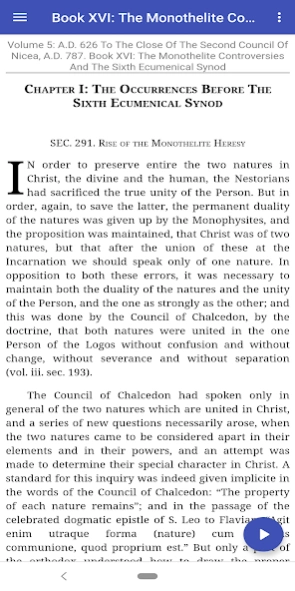A History Of The Councils Of T 1
Free Version
Publisher Description
A History Of The Councils Of T - A History Of The Councils Of The Church (Charles Joseph Hefele) Trial Verison
The first Seven Ecumenical Councils fundamentally defined the Christian faith. These councils were gatherings of the important figures of the Christian world who voted on doctrinal matters and instituted laws for the church.
In this five volume set the German Catholic bishop and theologian Karl Josef von Hefele gives the full history of these important councils and the events surrounding them.
The seven councils are summarized below:
First Council of Nicaea (325 A.D.)
+ Arianism – the belief that the Son of God did not always exist, but was created by—and is therefore distinct from—God the Father. The First Council of Nicaea declared this belief heretical, as did the First Council of Constantinople.
+ Easter date – the date for celebrating Easter was chosen so as not to conflict or be on the same day as the Jewish Passover.
+ Meletius of Lycopolis – bishop of Lycopolis in Egypt. Founder and namesake of the Melitians, who refused to receive in communion those Christians who had renounced their faith during the persecution and later repented of that choice.
+ Nicene Creed – the declaration of the faith of the church
+ 20 Canon Laws issued, including several addressing the primacy of Roman, Antochian, and Alexandrian patriarchs.
First Council of Constantinople (381 A.D.)
+ Arianism – the belief that the Son of God did not always exist, but was created by—and is therefore distinct from—God the Father. The First Council of Constantinople declared this belief heretical, as did the First Council of Nicaea.
+ Macedonianism – also known as Pneumatomachi; an anti-Nicene Creed sect which flourished in the countries adjacent to the Hellespont during the latter half of the fourth, and the beginning of the fifth century. They denied the divinity of the Holy Ghost, hence the Greek name Pneumatomachi or 'Combators against the Spirit'.
First Council of Ephesus (431 A.D.)
+ Nestorius – teachings included rejection of the long-used title of Theotokos ("Mother of God") for the Virgin Mary, and were understood by many to imply that he did not believe that Christ was truly God. The Council formally condemned him and his followers for heresy.
+ Nestorianism – emphasizes the disunion between the human and divine natures of Jesus.
+ Caelestius – major follower of the Christian teacher Pelagius and the Christian doctrine of Pelagianism, which was opposed to Augustine of Hippo and his doctrine in original sin, and was later declared to be heresy. He and his followers were declared heretics during this council.
+ Nicene Creed – the declaration of the faith of the church - confirmed. Departure from the creed decreed as heretical.
+ excommunication – eviction from the church. This was the punishment decreed at this council for those who did not accept Church doctrine
+ The Virgin Mary – Mary, mother of Jesus. This council decreed she is to be called Theotokos (God-bearer)
Council of Chalcedon (451 A.D.)
+ Chalcedonian Creed – declares that Jesus Christ is both truly God and truly Man
+ 27 Canon Laws
Second Council of Constantinople (553 A.D.)
+ Three Chapters – three people and their writings – person and writings of Theodore of Mopsuestia,Certain writings of Theodoret of Cyrus,The letter of Ibas of Edessa to Maris – repudiated as Nestorian
Third Council of Constantinople (680-681 A.D.)
+ Monothelitism – teaches that Jesus Christ had two natures but only one will. This council repudiated this belief.
+ Monoenergism – teaches that Jesus had two natures but only one "energy." This council repudiated this belief.
Second Council of Nicaea (787 A.D.)
+ Byzantine Iconoclasm – the practice of destroying icons and images. This council repudiated this belief.
+ This council decreed that altars must contain a relic.
+ 22 Canon Laws
About A History Of The Councils Of T
A History Of The Councils Of T is a free app for Android published in the Reference Tools list of apps, part of Education.
The company that develops A History Of The Councils Of T is Steven K. Burger. The latest version released by its developer is 1.
To install A History Of The Councils Of T on your Android device, just click the green Continue To App button above to start the installation process. The app is listed on our website since 2019-07-31 and was downloaded 2 times. We have already checked if the download link is safe, however for your own protection we recommend that you scan the downloaded app with your antivirus. Your antivirus may detect the A History Of The Councils Of T as malware as malware if the download link to patristicpublishing.councilstr is broken.
How to install A History Of The Councils Of T on your Android device:
- Click on the Continue To App button on our website. This will redirect you to Google Play.
- Once the A History Of The Councils Of T is shown in the Google Play listing of your Android device, you can start its download and installation. Tap on the Install button located below the search bar and to the right of the app icon.
- A pop-up window with the permissions required by A History Of The Councils Of T will be shown. Click on Accept to continue the process.
- A History Of The Councils Of T will be downloaded onto your device, displaying a progress. Once the download completes, the installation will start and you'll get a notification after the installation is finished.


